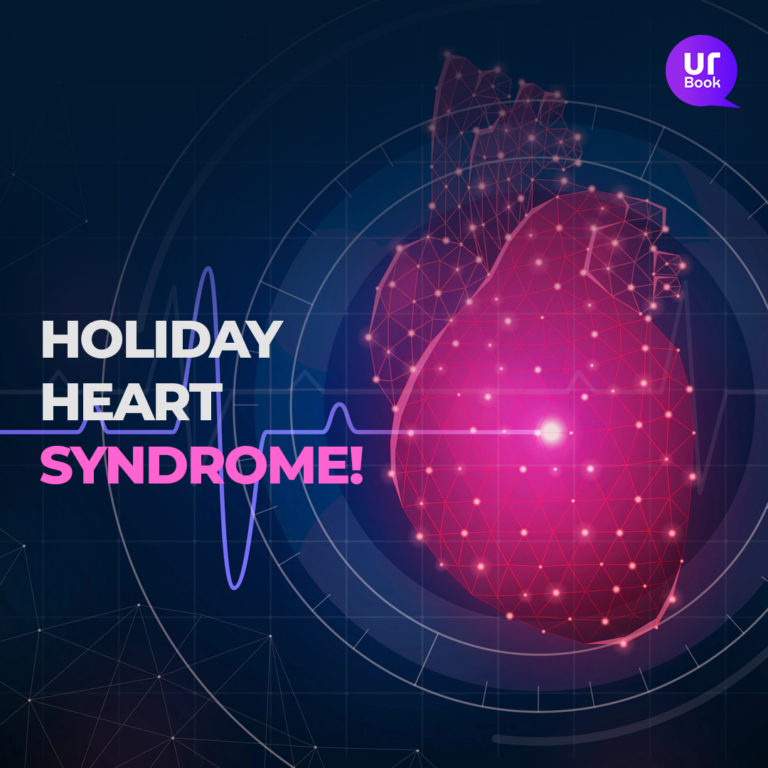
It’s time to make merry and celebrate with friends and family. Holidays are most certainly about cookies, cakes, and the company of loved ones. And being mentally unavailable for the next 7-10 business days! But as much as you’d like to be on break, health never takes a holiday.
Between rum cakes and mulled wines, there is a vast land filled with holiday heart syndrome. Too much rich, salty food and alcohol can do far more damage than you think, especially to the heart.
‘Tis the season for holiday heart syndrome
Holiday heart syndrome (or alcohol-induced atrial arrhythmias) is a heart issue that happens when people mix too much alcohol with salty, fatty foods. In essence, excessive alcohol consumption (either chronic or binge drinking) causes irregular heart rhythms, also known as atrial fibrillation or AFib.
The term “holiday heart syndrome” (HHS) was coined way back in 1978 by Dr. Ettinger when the number of patients who came to emergency rooms suffering from cardiac arrhythmias jumped.
The thing about HHS is that it can happen to healthy people, too. While those with heart conditions are more vulnerable, it can affect anyone during the holidays, including regular and infrequent drinkers.
People who rarely drink are unknowingly putting themselves at risk of HHS. They would attend an office party one night. The next day they go to a private to-do, then to a family get-together, and so on. Each day they have a drink, and that becomes binge drinking.
However, there is good news. Holiday heart syndrome is reversible. If diagnosed early and followed by alcohol abstinence!
What’s binge drinking got to do with holiday heart syndrome?
Binge drinking releases certain compounds in the blood, such as adrenaline. These are stress hormones that stimulate the heart muscles, making them beat faster. Excessive alcohol consumption also changes the electrolyte levels in the body and can even short-circuit the heart’s electrical system. All of these can lead to an irregular rhythm, putting you at risk of holiday heart syndrome.
Holiday heart syndrome can happen due to factors beyond excessive alcohol intake
There is a lot of science behind what causes HHS. What you need to remember is that during Hanukkah, Christmas, or New Year’s Eve celebrations, many factors combine to become the culprit.
- Caffeine: Too much coffee not only makes your heart race, but it also causes dehydration. Both of which can lead to arrhythmia. So, keep track of how many cups you have after late-night Christmas parties.
- Gluttony: The continuous flow of fatty meals full of salt during the holidays increases blood pressure. Suffice to say, unbridled eating is just as harmful as drinking.
- Stress: Elevated stress levels cause anxiety and release epinephrine in the blood, which is another hormone that can make the heart thump.
- Cold: Low temperatures are hard on the heart. When you’re out in the cold, arteries tighten up, raising blood pressure and putting extra strain on the heart.
Combine stress, food, caffeine, cold, and alcohol with a lack of sleep and dehydration, and it creates a perfect storm for holiday heart syndrome.
Complications of holiday heart syndrome
HHS usually goes away on its own when you stop drinking or take the right doctor-prescribed medication to lower your heart rate. For most people.
But for those with a history of cardiac conditions, the syndrome is very real and potentially deadly. They are at a greater risk of HHS complications.
When unchecked, holiday heart results in serious complications such as stroke, end-stage liver disease, angina (pain), enlargement of the heart muscles (cardiomyopathy), heart attack, and even death.
What does a holiday heart feel like?
A flutter or quiver in the chest. A thumping. A skipping heartbeat. Or even the heart beating way too fast, slow, or hard. That’s how holiday heart syndrome feels like.
Such palpitations are the most common sign of HHS. However, there are other, more serious tidings of the syndrome than just a different-than-usual heartbeat.
Symptoms of holiday heart syndrome that are cause for concern
If you suspect HHS, look out for signs like:
- Anxiety
- Nausea
- Fainting
- Vomiting
- Cold sweat
- Sudden dizziness
- Light-headedness
- Feeling weak or tired without reason for days (especially for women)
- Shortness of breath: sometimes this is the only HHS symptom. It can occur with or without chest pain or discomfort while you’re resting or being physically active.
- Chest pain: You may feel pain in the center or left side of the chest. The feeling of pressure, squeezing, or fullness can happen in breaks (it goes away and comes back) and usually lasts for more than a few minutes. It may also feel like heartburn or indigestion.
- Discomfort: Another sign you should be aware of is any upper-body discomfort. This includes the back, shoulders, neck, jaw, one or both arms, or the stomach (but above the belly button).
Don’t wait to consult a doctor because you don’t want to ruin the holiday. Seek help before you put yourself at worse risk.
Dashing holiday heart syndrome
Moderation is the first step to preventing holiday heart syndrome, especially if you smoke, are overweight, or live with:
- High blood pressure
- High cholesterol
- Heart disease
- Diabetes
Enjoy the holidays, but be conscious of how much alcohol you consume and the food you eat. For the simple reason that digesting heavy meals makes the heart work overtime, and over-drinking increases blood pressure and heart rate.
The second step to prevent holiday heart is plenty of water and at least some exercise. Drinks, cocktails, and the tidbits we love to munch on with them are dehydrating, so have as much water as you can. While you don’t have to worry about shedding weight during Christmas, focus on not gaining more too by:
- Minimize stress, which includes tabling any big family discussions until after the season is over
- Cutting back on excess by practicing portion control
- Weighing yourself to keep track
- Prioritizing sleep
- Staying active
Did you know?
A typical person gains 3 to 5 pounds during the holidays, but only loses 2 or 3 pounds in January!
Preventing HHS looks a little different for anyone who lives with a heart condition or has suffered a heart attack. Yes, you too should severely limit alcohol and fatty foods, but you should also avoid rigorous chores like shoveling snow, particularly if you don’t follow an exercise regime. And when you’re thinking of stepping outside, bundle up.
Have a heart-healthy holiday
Winter is a double whammy. You’re not just at risk of holiday heart syndrome. They’re more likely to be fatal. Research proves a 5% increase in heart-related deaths during the holiday season.
With that in mind, we leave you with one piece of advice. If at any point during the yuletide you notice the warning signs of heart trouble, stop drinking immediately and get checked by a doctor!
Acting sooner than later can save your life.
